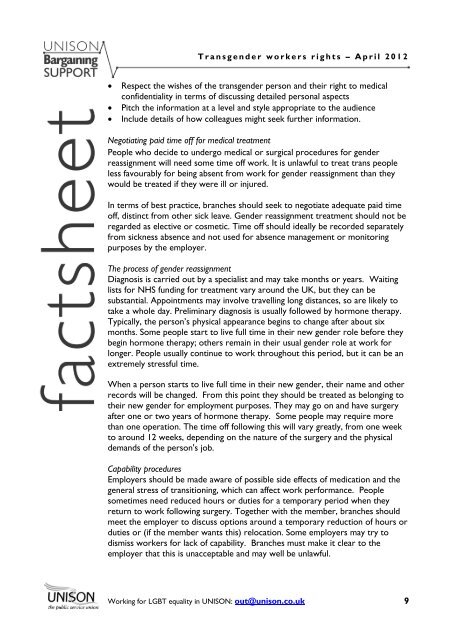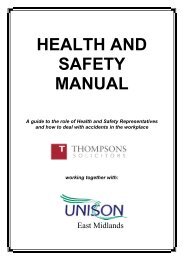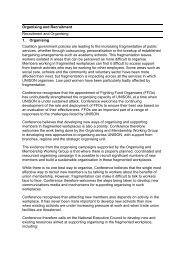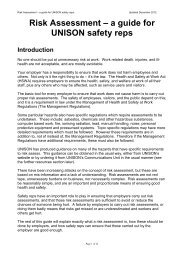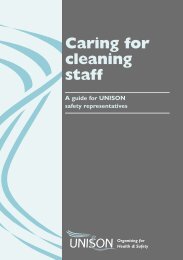TRANSGENDER WORKERS RIGHTS - Unison
TRANSGENDER WORKERS RIGHTS - Unison
TRANSGENDER WORKERS RIGHTS - Unison
Create successful ePaper yourself
Turn your PDF publications into a flip-book with our unique Google optimized e-Paper software.
T r a n s g e n d e r w o r k e r s r i g h t s – A p r i l 2 0 1 2<br />
Respect the wishes of the transgender person and their right to medical<br />
confidentiality in terms of discussing detailed personal aspects<br />
Pitch the information at a level and style appropriate to the audience<br />
Include details of how colleagues might seek further information.<br />
Negotiating paid time off for medical treatment<br />
People who decide to undergo medical or surgical procedures for gender<br />
reassignment will need some time off work. It is unlawful to treat trans people<br />
less favourably for being absent from work for gender reassignment than they<br />
would be treated if they were ill or injured.<br />
In terms of best practice, branches should seek to negotiate adequate paid time<br />
off, distinct from other sick leave. Gender reassignment treatment should not be<br />
regarded as elective or cosmetic. Time off should ideally be recorded separately<br />
from sickness absence and not used for absence management or monitoring<br />
purposes by the employer.<br />
The process of gender reassignment<br />
Diagnosis is carried out by a specialist and may take months or years. Waiting<br />
lists for NHS funding for treatment vary around the UK, but they can be<br />
substantial. Appointments may involve travelling long distances, so are likely to<br />
take a whole day. Preliminary diagnosis is usually followed by hormone therapy.<br />
Typically, the person’s physical appearance begins to change after about six<br />
months. Some people start to live full time in their new gender role before they<br />
begin hormone therapy; others remain in their usual gender role at work for<br />
longer. People usually continue to work throughout this period, but it can be an<br />
extremely stressful time.<br />
When a person starts to live full time in their new gender, their name and other<br />
records will be changed. From this point they should be treated as belonging to<br />
their new gender for employment purposes. They may go on and have surgery<br />
after one or two years of hormone therapy. Some people may require more<br />
than one operation. The time off following this will vary greatly, from one week<br />
to around 12 weeks, depending on the nature of the surgery and the physical<br />
demands of the person's job.<br />
Capability procedures<br />
Employers should be made aware of possible side effects of medication and the<br />
general stress of transitioning, which can affect work performance. People<br />
sometimes need reduced hours or duties for a temporary period when they<br />
return to work following surgery. Together with the member, branches should<br />
meet the employer to discuss options around a temporary reduction of hours or<br />
duties or (if the member wants this) relocation. Some employers may try to<br />
dismiss workers for lack of capability. Branches must make it clear to the<br />
employer that this is unacceptable and may well be unlawful.<br />
Working for LGBT equality in UNISON: out@unison.co.uk 9


